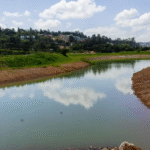Posts tagged with 'water'
Walking through Nyandungu Eco-Park in Kigali, Rwanda, it’s difficult to imagine that just a few years ago, industrial machinery and bedraggled grasses stood where lush trees and flowers now grow. Like in many wetlands across the city, the incursion of polluting industry ...

As cities try to restore the benefits of natural systems by mimicking how ecosystems function, one option they can use is nature-based solutions (NBS). However, cities often struggle to determine which types of interventions best suit their local context, due ...

With about 464 millimeters of rainfall per year — less than half the global average — South Africa is one of the driest countries in the world. Its semi-arid climate, uneven rainfall distribution and persistent droughts leave the country facing chronic water ...

In Gauteng Province, the Jukskei River winds its way through the heart of Johannesburg’s inner-city neighborhoods, informal settlements and suburban areas, eventually joining the Crocodile and Limpopo rivers before emptying into the Indian Ocean. One of the biggest waterways in ...

South Africa’s cities face growing threats to their water resources, especially rivers, as rapid development and climate change undermine the health of water systems and the ecosystem services they provide. Urban areas are particularly vulnerable to serious flood risks during ...

Despite accounting for less than 3% of global terrestrial area, cities have had an outsized impact on our approach to planetary boundaries, affecting biodiversity and consumption of materials and energy. Studies show that cities have become responsible for 78% of carbon emissions, ...

Extreme weather events like floods and droughts are becoming more frequent and intense around the globe, disrupting communities and the infrastructure they rely on. In 2024 alone, the world endured 58 disasters that wreaked over a billion dollars in damages each. Yet ...

Looking at more than 350 urban leaders and experts gathered in Nairobi, Kenya, for the Green & Resilient UrbanShift Africa Forum, Dr. Cromwel Lukorito, Vice Chair of the Intergovernmental Panel on Climate Change (IPCC) Working Group II, issued a simple ...

Africa’s cities, from large metropolises to smaller towns, are increasingly characterized by growing urban sprawl. Kinshasa, Democratic Republic of Congo, is expanding by about 2,000 people and 5 hectares (10 football fields) every day, according to a World Bank estimate. Kumasi, an intermediary ...

Imagine stepping into a city where sustainability isn’t just built upwards but also downwards. While cities worldwide grapple with intensifying climate risks—flooding, heatwaves and infrastructure strain—an untapped solution lies right beneath our feet. The underground isn’t just for subways and ...

COP30 in Belém, Brazil, will be the most substantial and strategic mechanism for local and subnational governments to influence and impact national and global sustainability agendas in 2025. As we gear up for the mid-year Bonn Climate Conference, it is ...

For the 21 million residents of Lagos, Nigeria, climate change is not a distant concept — it is a current reality. Over the past decade, the city has experienced devastating floods, exacerbated by the loss of over half of its wetlands ...

For more than 20 years, WRI has identified annual “stories to watch.” These are the year’s moments, issues and decisions that we believe will shape the future trajectory of the world. In the past, we’ve highlighted things like dangerous heat in cities, ...

Moldova’s capital city, Chișinău, recently secured a €20 million investment to tackle flooding and pollution of the Bîc River, aiming to transform it into a valuable recreational amenity for 100,000 residents and mitigate future flood risks. This funding, which combines loans from ...

2024 was tumultuous. Cities saw record-breaking temperatures, a sharp uptick in climate-related disasters, violent conflict in too many places, and contentious elections that shifted local, national and regional politics. But amidst the tumult, cities centered themselves as global leaders in ...




























